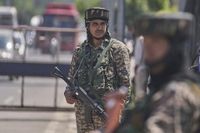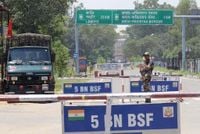On April 30, 2025, tensions between India and Pakistan reached a critical point as military officials from both countries exchanged alarming statements, hinting at the possibility of imminent conflict. The escalation follows a deadly attack on April 22 that killed 26 Indian tourists in Pahalgam, a popular hill station in the Indian-administered region of Kashmir. The assault has reignited long-standing grievances between the two nuclear-armed neighbors, with each side accusing the other of supporting terrorism.
Pakistan's Information Minister Attaullah Tarar announced that there is credible intelligence suggesting India might launch military action within the next 24 to 36 hours, using the Pahalgam incident as a pretext. He emphasized that any aggression from India would be met with a decisive response, stating that "India will bear full responsibility for possible catastrophic consequences in the region." Meanwhile, Pakistani Defense Minister Khawaja Muhammad Asif, speaking to Reuters on April 28, warned that a military invasion by India was imminent, although he later clarified that this should not be interpreted as a definitive prediction of war starting within days.
Asif noted, "If something is going to happen, it will happen within the next two to four days; otherwise, the immediate danger will pass." In a show of preparedness, Pakistan has reportedly reinforced its military presence along the border and positioned naval vessels to counter any potential Indian invasion.
The United States has been closely monitoring the situation, urging both nations to de-escalate tensions. Secretary of State Marco Rubio is expected to hold talks with the foreign ministers of Pakistan and India in an effort to prevent further escalation. The international community is particularly concerned about the potential for conflict in a region already fraught with instability.
The conflict began following the attack in Pahalgam, which India labeled a "terrorist attack" with alleged cross-border links to Pakistan. India accuses Islamabad of harboring militant groups responsible for such violence, while Pakistan denies any involvement. The militant group known as the "Kashmir Resistance" has claimed responsibility for the attack, further complicating the already tense situation.
In response to the Pahalgam incident, India has taken several punitive measures against Pakistan, including suspending a key water-sharing agreement, closing the only land border crossing, and reducing its diplomatic presence in Islamabad. India has also canceled visas issued to Pakistani citizens, while Pakistan reciprocated by closing its airspace to Indian airlines and suspending trade with India. Pakistani authorities have warned that any attempt by India to redirect water flows would be considered an "act of war."
Historically, the Kashmir region has been a flashpoint for conflict between India and Pakistan since the two countries gained independence from British rule in 1947. The princely state of Jammu and Kashmir, which has a Muslim majority but a Hindu ruler, was a contested territory that became a focal point for military clashes and terrorism. Both nations claim the region in full but control only parts of it, leading to a series of wars and ongoing violence.
In 2019, tensions escalated dramatically when India revoked the special status of Jammu and Kashmir, further aggravating relations with Pakistan. Since then, the region has witnessed increased militarization and violence, with many civilians caught in the crossfire.
In recent years, both countries have developed nuclear arsenals, which serve as a deterrent against full-scale war. India adheres to a "no first use" policy regarding nuclear weapons, meaning it would only retaliate with nuclear force if attacked first. Conversely, Pakistan's defense strategy includes the potential use of tactical nuclear weapons in response to conventional military threats from India, a stance that raises the stakes for any military confrontation.
Analysts warn that the current crisis could lead to unforeseen consequences, echoing the events of 2019 when India conducted airstrikes inside Pakistan following a suicide bombing that killed 40 Indian soldiers. That incident brought both nations to the brink of war, although international intervention ultimately helped de-escalate tensions.
The current situation is further complicated by domestic pressures within both countries. Prime Minister Narendra Modi has vowed to "identify and punish every terrorist and their backers," signaling a readiness for military action. Meanwhile, Pakistan's military leadership is under pressure to demonstrate strength in the face of perceived aggression from India.
Both nations are currently engaged in a dangerous game of brinkmanship, with each side's military actions potentially provoking a swift and severe response from the other. The risk of miscalculation is high, and the consequences of any military engagement could be catastrophic.
As tensions rise, the international community remains watchful, urging both sides to exercise restraint. The ongoing conflict in Kashmir not only threatens the stability of South Asia but also poses a significant risk to global peace. With both nations on high alert and nationalist sentiments running high, the world can only hope for a peaceful resolution to this escalating crisis.
In summary, the situation in Kashmir is precarious, with the potential for violence looming large. The tragic events in Pahalgam have rekindled hostilities, and both India and Pakistan must navigate this turbulent landscape carefully to avoid a catastrophic escalation.


